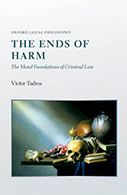The Ends of Harm
 Author: Victor Tadros
Author: Victor Tadros
New York, Oxford University Press, 2011, p. 384
Reviewer: Alec Walen | May 2012
What can justify harming people the way we, as a society, normally harm those convicted of crimes? Retributivists, at least as Victor Tadros understands them, think that the answer is, at least in part, that they deserve it for having committed their crimes. “Bad people, or those who do bad acts, deserve to suffer.” (25) Tadros rejects that idea as morally “barbaric.” (59) How, he asks, can the commission of a crime turn suffering from something that is intrinsically bad into something that is intrinsically good? Tadros thinks there is no plausible answer to this question, and argues instead for the claim that the only thing that could come close to justifying our current penal practices—and he’s skeptical that they can be justified—is the need to deter future criminal behavior.
Before going further I must warn the reader that this book is an exercise in moral philosophy. It does not contain any extended discussions of what would be the most effective or least costly forms of general deterrence. Nor does it discuss the political dimensions of penal policy, or their historical grounding in class or race relations, or any such thing. Rather, it uses moral thought experiments to try to tease out moral principles that can provide a morally sound basis for punishment. This will seem to many readers like a pointless detour from what matters in reforming our penal system. But for those who have a taste for contemporary moral philosophy, this book presents an exemplary exploration of a topic that, even if it does not convince in the end, pushes one to think harder about how to justify one’s own beliefs.
Now, as I said, Tadros thinks that only deterrence of future crime can come close to justifying our current penal practices. This sort of instrumentalism is normally associated with consequentialism, and that may seem problematic, as consequentialism seems incapable of explaining why it is wrong to “punish the innocent or [to] punish the guilty disproportionately if these things would do more good than harm.” (42) Indeed, Tadros quite plausibly claims that this failure significantly accounts for why so many criminal law theorists accept retributivism. But, says Tadros, there is a third way: one can embrace a non-consequentialist form of instrumentalism, one constrained by the means principle (MP), which prohibits, with certain exceptions, using people as a means.
The key to justifying punishment in an instrumentalist but non-consequentialist way, then, is to show that harming those who have committed crimes can fit into one of the exceptions to the MP. These exceptions include, for example, the idea that A is normally entitled to use B as a means if B consents to being so used—that’s what happens when B sells his services in an employment context. In the criminal context, the relevant exception, according to Tadros, is that the state may use D as a means of deterring both D and others from committing crimes—doing so by inflicting suffering on D, the likes of which others will want to avoid, and D will want to avoid suffering again—if D has violated the rights of others.
One might object that this is not so different from the position that most retributivists hold. Few retributivists think that desert fully explains why we punish. Most accept that punishment is substantially justified by the good that it achieves (primarily deterrence and incapacitation of the dangerous), and see positive desert as an easily outweighed part of the overall justificatory package. For most retributivists, then, what is often called negative desert is the real key to their retributive understanding of punishment. And negative desert is nothing other than the thought that when a person commits a crime, he loses his right not to be punished up to some amount proportional to the severity of his crime. In other words, negative desert licenses the state to punish criminals, up to some proportional limit, when doing so would serve some instrumental good. Negative desert does not presuppose that the suffering of criminals has intrinsic value; it presupposes only what Tadros himself accepts, namely that committing crimes makes criminals liable to be punished for instrumentalist reasons.
Nonetheless, Tadros is not merely espousing a version of negative retributivism. Though he is less clear about this in the book than one would want, he thinks that negative retributivism is as morally question begging as positive retributivism. This gets to the core of why his book is interesting and important. We don’t really understand why a person should be liable to being punished if all we say is: it follows from having committed a crime. What Tadros proposes to offer is an account of liability that ties it to more basic moral ideas concerning how people acquire duties in virtue of having wronged others. Thus what Tadros offers us is a “duty view” of punishment. (12)
One bedrock moral move for Tadros, one that he takes from Tim Scanlon, is that if A chose to do something, which he had a moral obligation not to do, and as a result of that choice either he or B must suffer some harm, then assuming the harm to B would not be much less than the harm to A, it should be A who suffers the harm. This choice principle shows that we can sometimes explain why it is right that a person suffer—because that is the preferred distribution of suffering—without having to appeal to the idea that the person deserves to suffer. And it allows us to justify proportional self-defense against culpable aggressors on the ground that they should have and could have chosen not to aggress in the first place. (172)
Another basic moral premise for Tadros is that one who unleashes an unjustified threat has a duty to take action, even at significant cost to himself, to prevent the threatened harm from being realized. Thus if A hires a hit man to kill B, A has an obligation to sacrifice himself if necessary to save B, say by interposing himself between the hit man and B. (188) Moreover, such duties are often enforceable, meaning that B or a third party could use A as a means of preventing the hit man from killing B. (189)
The question is: how can we go from justifying self- or other-defense against culpable aggressors whose threatened harm has yet to materialize to punishment of people who have culpably caused harms? Tadros’s answer has three steps. First, if A can no longer carry out his duty to prevent a threatened harm to B from being realized, then A has a residual duty to try to make B whole, a duty of “compensation.” (3) Second, one way for A to compensate B is to sacrifice himself, if necessary, to protect B from future attacks. (277)
The third step involves the notion of an exchange. Rather than being locked into the view that if A harms B, A must sacrifice himself to make B whole, we allow that people have a duty to cover for each other’s duties to make others whole. Imagine, then, that A has harmed B, that C has harmed D, that A could protect D from future harms by sacrificing himself for D’s sake, and that C could protect B from future harms in the same way. Then A and C should agree to make this swap. If we generalize this move, we reach a regime of deterrent punishment. Each convicted criminal has an enforceable duty to help crime victims avoid being further victimized by submitting themselves to harsh but proportional criminal punishment in the effort to prevent further criminal acts from taking place. And the state has reason to step in to ensure that the duties criminals owe to victims are honored in a fair and reliable way.
This is an ingenious attempt to reconstruct central features of our punitive practices in a way that is both instrumentalist and respectful of the MP. I should also point out that there is more to the book than this central thread of argument, including an interesting discussion of Anthony Duff’s defense of punishment on communicative grounds, of self-defense, and of the nature of the MP itself. But in what remains of this review I want to focus on two worries I have regarding how well the central argument works.
First, the starting point for the argument is that criminals who harm their victims have an enforceable duty of compensation to their victims. It remains unclear to me why this compensation must be made in the form of protection against future crimes? What if victim V prefers that criminal C pay her money damages? Shouldn’t V have the choice to receive compensation in that way? But if so, wouldn’t that have some implications that are difficult to accept, such as that the rich can commit crimes and then make their victims whole in such a way that further punishment would then be out of place?
Tadros has three separate responses to this objection, none of which is fully convincing. First, he says that if the wealthy “could offend and compensate later at little cost to themselves” then “our threats to other wealthy people would be rendered ineffective.” (289) This, however, is question begging. If other wealthy people could also compensate their victims—fully, so that their victims felt no worse off for having been violated and then compensated—then it’s unclear what the objection is. Insofar as we think there is an objection to the wealthy violating the law with impunity, that’s because we think of the law as setting public standards, as opposed to being a matter of private wronging. But it’s unclear if Tadros can bridge that gap.
Second, Tadros offers an account as to why, if A harms B, A might be obliged to make B better off than if A had done nothing. This would be true if A could make B as well off as if A had done nothing by doing something he would be obliged to do for B anyway, but he could make B better off by making a bigger sacrifice. The problem with this argument is that it is so indefinite. It does not tell us how much one who harms another must suffer to have paid off his debt. So it is unclear why it should follow that a wealthy person could not simply make a large payment to his victim, large enough to make the victim better off than if he had never been harmed, and then leave it at that. It might be that the wealthy have to pay until it hurts, and that they therefore cannot wrong with “impunity.” But it is again unclear how this result should follow from a compensation model.
Third, Tadros offers a response in terms of the state’s right to punish, one that overrides a victim’s right to choose not to seek punishment. One of the reasons is that the criminal owes everyone, not just his victim, for the diversion of state resources necessary to keep him, qua criminal, under tighter surveillance. (297) But wealthy criminals could meet that obligation by paying for their own surveillance, and that would again allow them to escape normal punishment. Another reason is that “victims of crime have an obligation to protect other people from criminal offending.” (297) This may be so, but why should it be so great as to require the victim to give up a preferred form of compensation altogether? Why not let the victim pay her taxes as normal, using them to cover the needs others have for protection? Why require payment in kind, as it were?
Another argument that Tadros might offer is that a victim who did not participate in the general punishment scheme would be free-riding on the deterrent benefits others would contribute to that scheme by having those who harmed them punished. But this idea too will not work. After all, everyone, even those who have not yet been victims, benefit from the deterrence of future criminal acts. Are those who have not yet been victims free-riding somehow on the victims who take their compensation in the form of general deterrence? That seems hard to believe. But then compensation to a victim that makes the victim whole returns a victim to the status of all who have not yet been victimized. Why shouldn’t a victim be free to seek that if compensation is the foundational duty in this model? It seems that the only way to avoid this problem is not to start with the thought that criminals owe a duty of compensation to their particular victims. But, in that case, Tadros’s argument never gets off the ground.
There is also the problem of attempts. Again, the model is based on the idea of compensation owed for harms caused. But in the case of attempted crimes, no harm has been caused. It would seem, then, that no compensation would be owed, which would imply that no punishment would be appropriate. This would be quite hard to accept, however. From both a retributive and a consequentialist perspective, attempters should be punished as much or nearly as much as those who complete their crimes.
Tadros has two main responses to this problem. First, he says that we might justify punishing attempters “on grounds of special deterrence.” (326) “We punish attempters because we know that if we don’t do so they will harm us in the future.” (326) Second, he says that we have a reason of general deterrence to punish them, which is that they cause us to “divert our security resources away from other people who will then be more likely to be able to harm us, or they would do were we not to punish them.” (326)
But these are not very satisfying answers. Suppose A, who attempted a double-murder of his wife and her lover, has always been a peaceful person, and it was just in this one instance that he was driven to attempt a violent act by intense jealousy of the other two. Imagine that, shortly after A’s unsuccessful attempt to kill them both, they died in a car accident. He is now full of remorse and we believe he is no longer a threat to anyone. That seems to undermine both of Tadros’s rationales for punishing him, but it is quite counter-intuitive to say that he deserves no punishment.
To be fair, Tadros addresses attempts very quickly in this book, and is planning to say more about it in his next book. So maybe there is something good he can say which allows him to avoid either saying that the man from my example should escape punishment or admitting that negative desert must be part of our understanding of punishment. Nonetheless, until I see how this account goes, I remain for the two reasons just given a retributivist.
I don’t want to end simply by saying that I am not convinced. It is much more important to say that Tadros made me think more seriously than I had before about what could justify inflicting harm as we do when we punish people. Even if Tadros’s account ultimately does not succeed, it still provides a helpful model of how to think carefully and seriously about justifying this fundamentally brutal practice. Retributivists, myself included, have been fairly lazy about examining why having committed a crime creates either negative or positive desert. We owe a debt of gratitude to Tadros for forcing us to look at our own views more carefully.
Alec Walen is an Associate Professor of Law and Philosophy at Rutgers University.


